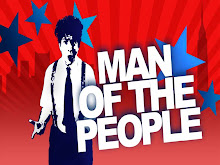Hey, Festival People,
I was going to post my reviews of "Clowns with Gowns" and "Ferdinand" altogether, and then felt like the whole thing was too long. So I broke it up into three parts. Below is a little commentary on a binding concept, "motivation", I use to talk about both shows. I will post my comments of those two good shows separately and shortly. The comments below may help contextualize my reviews of those shows, but feel free to skip if you want to get to more of a review.
The following is a commentary on the concept of "motivation," with a particular focus on Clown Theatre.
Motivation is one of those monumentally loaded words in the theatre. It is a sine qua non of the theatrical, in at least two senses of the word. First, dramatically speaking, characters MUST be in front of us for some reason. Even in an “absurd” text (“absurd” being a fairly loaded word in itself), characters pursue something. They may not know what it is. We may not know what it is. Motivation may not even have to come from the dramatic circumstances. It may, rather, come from a “performative” impulse, like that of a dancer or acrobat, or (I imagine) someone acting in a Robert Wilson spectacle. This is the second part of motivation, which could also be labeled “desire”, or “daring”, or “need”. It is the focused work of the performer as virtuoso, actively looking for moments, possibilities, extensions, collaborations.
Motivation is also one of the fundamental clichés of actors and egos. “What's my motivation?” the actor whines to his director in the old joke. “Your goddamn paycheck, THAT'S your motivation!” the director responds. And while this seems a little callous on the director's part, I have in the past sided with that callous director. This isn't because I find actors to be a generally whiny, temperamental lot, although as an actor I have been, at times, both whiny and temperamental. Rather, it is because the “what's my motivation?” quip can feel a lot like that much more annoying quip one gets occasionally when directing actors of, “my character wouldn't do that!” Really? Are you so sure you know exactly what you, as a person, are liable to do in the next five minutes?
Both these statements sometimes to me indicate a lack of imagination more than anything else. “You don't know what your motivation is? Figure it out. Try something. If that doesn't work, try something else! The focus is not on your little preconceived plan, but what you discover in the moment!” Of course one must find the appropriately persuasive means to get this idea across, preferably avoiding any tactic that involves shame or condescension...
Dramatic motivation in a clown show can be further broken into two parts, which could be labeled “truth” and “treatment”. (I am indebted to my teacher, Bob Berky, for this terminology) First, in terms of “truth,”: “why are we here? What has the clown arrived to accomplish?” Usually the answer to this question includes “put on a show,” in some fashion or other. But what kind of show? What would the show look like, ideally, if the clown did not proceed to screw it up in all the delicious ways s/he will?
"Treatment,” then, refers to the way the clown(s) screw it up. It is the obstacles the clown(s) encounter: the difficulties with objects, with the audience, with lighting cues and music, with their own bodies, phobias, and fears, with hierarchy, with complicite, with their own view of the discrepancy between their expectations and reality (not an exhaustive list, nor universally applicable, of course) and the ways these obstacles affect the clown(s) and their relationships.
In terms of “Treatment,” motivation becomes, in part, a discussion of stakes. In a clown show, the stakes are generally very high. Stephen Buescher once was nice enough to spend some time with me and my friends as we struggled through our first clown show, some 12 years ago. One of the things he told us what that, (I am paraphrasing now) clowns are beings who live on the edges of the continuum between terror and the sublime. I take this to mean that clowns are, fundamentally, ridiculous beings who want things so very badly that even small projects – lining up, doing the dishes, introducing a numero – can erupt into a hilarious piece that rattles around our soul. Taken this way, a clown is not the opposite of a Stanislavkiian (another loaded term) actor, obsessively scoring each beat, each objective. Rather, the clown is the literal (and therefore absurd) realization of that ideal. This doesn't mean that clowns always live in desperation. But clowns generally are funnier when they play toward desperation, when they gradually allow the stakes to grow and affect them to such an extent that they take us to higher highs and lower lows.
So now we have some terms: “Motivation,” which can be broken down into “dramatic” and “performative” aspects. And a further breakdown of “dramatic motivation” into “truth,” and “treatment.” And we can tie it all together by observing that it is in the "treatment" that "dramatic" and "performative" motivations meet together in synthesis. That is, we construct a dramatic situation (truth plus treatment) for the clown to encounter and then push the clown to "eleven out of ten" in trying to pursue a goal.
"Motivation”, albeit in two very different senses, was the word I could find to unite two very different, entertaining shows that were paired together the day I saw them, “Clowns with Gowns”, and “Ferdinand the Magnificent”. If either one is said to encounter problems, those problems go back to motivation, in different ways. Check out my separate reviews of those shows in following posts.
Subscribe to:
Post Comments (Atom)

No comments:
Post a Comment